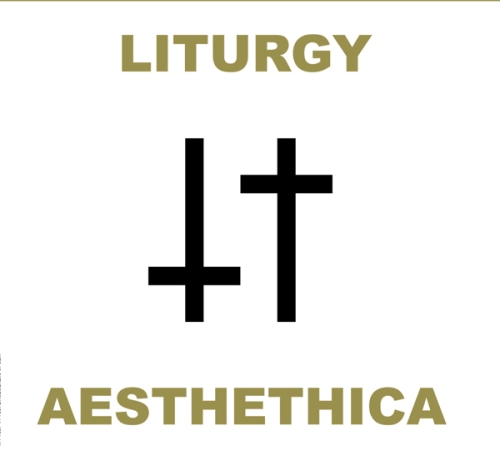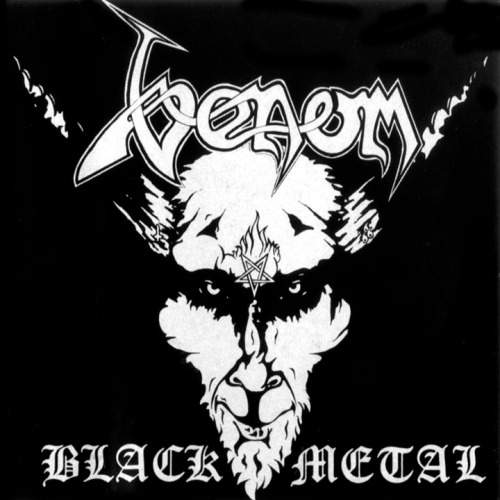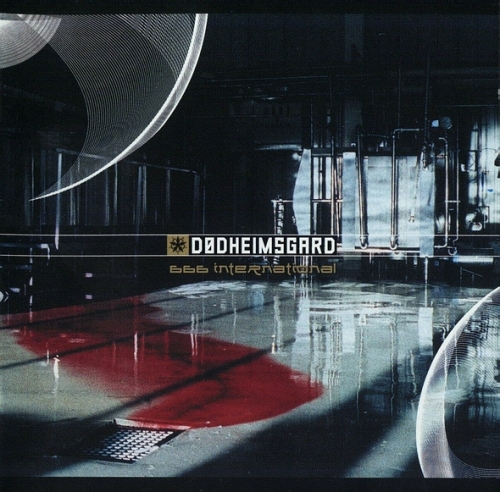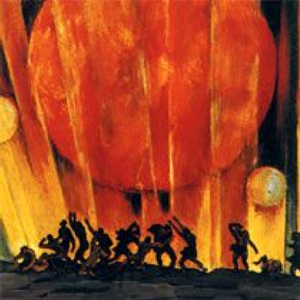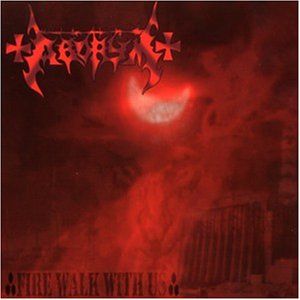I approached fellow blogger Josh Haun (of That’s How Kids Die infamy) a while back because I knew from conversations on Twitter that he and I would likely have drastically different opinions on the new Liturgy record. I didn’t really care enough about the record either way to do a full-on review, but I still thought there were a lot of issues circulating throughout the metal scene on which it might be interesting to get a dual perspective. So, obviously this isn’t quite the case of a real, knock-down, drag-out smackdown. We haven’t called each other names or made rude suggestions regarding the bovine origins of the other’s parents; we’re just two guys with too many opinions about music.
In case you’re not too clear on what we’re talking about in terms of the widespread accusations of hipsterism that get thrown around with this band, may we kindly suggest you watch as much of this interview with the “band” from Scion Rock Fest as you can stomach:
Now you see what we’re up against, right?
I asked Josh to give the album a listen and pass along his immediate reactions as something of an opening statement. What follows is therefore Josh’s opening thoughts, followed by my opening thoughts, after which point he and I traded emails back and forth to engage in a rather far-flung conversation that touches on everything from Darkthrone to Deathspell Omega, Moby to Beck, negativity to positivity to doofuses to hipsters to jasmine rice…and beyond. Thanks for reading, and please do let us know where you come down on any and all of these issues.
———————————————-
Opening thoughts on Liturgy’s Aesthetica:
Josh Haun: Listening to Liturgy’s Aesthetica after being woefully turned off by the few tracks I’d already heard prior to “obtaining” a copy. I recently saw a video interview where the singer could barely string a coherent sentence together (it went something like: “Like… um… like, philosophy 101-level bullshit… like, um, um, bullshit attempt to intellectualize black metal… like, um…) [Ed.: See above], so no surprise then that this appears to be black metal written by someone who doesn’t have the first clue about how to structure a song, much less play their instrument competently. Liturgy fans seem to have it in their head that the only reason anyone could possibly hate this band is because they’re “hipsters” (whatever the fuck that means), or because of how they look, dress, talk etc. I hate this band because I think the music is complete garbage and I don’t care whether the band is comprised of hipsters or Al Qaeda operatives. The manifestos and sorry excuses for interviews are just turd icing on a shit cake.
I’m on track three at the moment, and I’m getting images of preschoolers in corpsepaint banging away on Fisher Price instruments. Actually, preschool black metal would probably be more entertaining than this has been so far. Oh hang on a second, track 4 sounds like they’re trying something different. This track sounds like crappy, under-produced Meshuggah or something, which isn’t saying much since I don’t really care for Meshuggah. At least the obnoxious singer seems to have decided to shut the fuck up for this jam. This track appears to be two minutes and thirty seconds worth of ideas stretched out over seven minutes. Liturgy aren’t the only band that has this problem though, a lot of newer bands for some reason think a song has to drag on forever. This is not trance-inducing, this is boring – you can go ahead and end any time now, track 4… shit there’s still like a minute and thirty left. Well, at least the singer didn’t open his mouth for that entire time.
Aaaaaand we’re back to a piss poor black metal impression after that weird detour into djent-ville. Track 5 sounds exactly like tracks 1 through 3. I know this is my first time listening to the album and everything, but it probably isn’t good that I can’t tell the difference between tracks 1,2,3,5 and 6 so far, except on track 6 they added this effect where it sounds like the band is playing down the hall with the door closed for part of it. Does this band have a bass player? Do their guitars only have the 3 high strings on them? Does their singer have testicles? Track 6 is another one that goes on forever.
Track 7 seems to be from the soundtrack to the world’s most annoying Atari game. Do you fucking remember Atari? Did those games even have music? If they did, it would sound like this steaming pile of pointlessness. I guess the band threw in these little “curveballs” to break up the monotony of their utterly faceless treble assault. Wait, what’s this? Track 9 is actually piquing my interest. I’m getting a bit of a sludgy, Sabbathy vibe here. But alas, they don’t seem to be able to take it anywhere and my iTunes tells me they’re gonna drag it out to just shy of 8 minutes. This band simply does not understand the fundamentals of compelling songwriting. I know whoever’s reading this probably thinks I came into it already with a chip on my shoulder, but when Dan approached me about doing a hipster black metal throwdown, I really was willing to give Liturgy the benefit of the doubt, in spite of all the nonsense. Had they blown me away, I would have readily admitted defeat… people who know me and follow THKD know that I’m willing to admit when I’m wrong about something (see: Kvelertak, Ghost, etc).
Track 11 is a chorus of people saying “hey” over and over again. WHAT IN THE FUCKING FUCK IS THE POINT OF THIS?!?! I would have loved to have been a fly on the wall when this record was being finished: “Man, this is awesome!” Man, this is some pretentious horseshit! 3:30 of people saying “hey”. This must be what people mean by suicidal black metal, because this track is making me want to hang myself. What a surprise, they end the album with another track that sounds exactly like tracks 1,2,3,5,6,8 and 10. Playskool’s My First Black Metal Band. Thankfully, this is over.
Dan Obstkrieg: In preparing these preliminary notes for squaring off with Mr. Haun, I was trying very purposefully to keep my commentary to the music itself, knowing that our subsequent conversations would likely touch on all the extraneous cultural factors relevant to the debate over Liturgy and the potentially broader accusations of hipsters (or whatever) having infiltrated black metal.
Well, first things first: The album is definitely too long. That having been said, the pacing and sequencing are very well done, with a mid-album break and the occasional odd intro or outro that gives a breather before diving back into the smash-and-burn. Also on the negative side, those layered vocal-only sections are intensely annoying – the vocals work much better when restricted to a sort of white-out howl whipping around the outskirts of the instrumental maelstrom. All of this means, of course, that the Krallice comparisons are inevitable. In fact, if I didn’t have such an aversion to reading or seeing any interviews done by the band’s insufferable mouthpiece, I’d be interested to see if anyone has asked him point-blank about the undeniable Krallice influence.
The chugging, Meshuggah-lite sections are a nice touch, but they can drag on too long – the prime offender here being “Generation,” which has no business being as long as it is. This technique adds a lot to “High Gold,” and in general, I dig the abrupt starts and stops of many of the songs. The band is less effective when they try to do more traditional black metal tremolo riffing that isn’t simultaneously supported by their trademark jittery blast and crash. See the opening of “Sun Of Light,” for example – those melodies are just plain uneventful. “Veins Of God,” on the other hand, slows things down nicely, but again, there’s absolutely no reason it should go on for eight minutes. And yeah, seriously, “Glass Earth” is straight-up obnoxious. Almost painfully so, especially given that I’m already so favorably disposed to this band by this point in the album. What could possibly compel them to think that this was a good idea?
All of these criticisms and somewhat backhanded compliments aside, I do actually really like this album. Even though the ’90s alternative rock (play the start of “Tragic Laurel,” and then play the start of Beck’s “Jack-Ass”…) and new school American black metal influences (or ripoffs, depending on your persuasion) are quite clear, it still feels like Liturgy have found an individual approach, and it’s an approach that I find enjoyable. “Glory Bronze” is honestly one of the best songs I’ve heard all year, full of a legitimately affecting sense of yearning. Maybe the cardinal sin of Liturgy is that the main dude has tried to actively claim black metal, and therefore in the process repudiated or denigrated what many of us black metal fiends identify as the true, untainted spirit of the form.
The Debate:
Josh Haun:I have absolutely no problem with bands bringing aspects of other genres to black metal. Just look at bands like Blut Aus Nord and Deathspell Omega. These bands incorporate tons of outside influences, but they are black metal beyond question and I love them for it. I guess I just don’t see how this Liturgy is adding anything to black metal, unwanted or otherwise. The tracks that incorporate other influences, the Meshuggah-esque track and doomy track, for instance, don’t really incorporate any of the black metal influences found throughout the rest of the album. Relegating them to separate tracks tells me they don’t know how to blend their influences into a cohesive whole, which makes me wonder how they’re two album deep into their career and not still in the demo stage. Furthermore, the black metal tracks are completely stock, I don’t hear anything even remotely interesting in them, nothing whatsoever that draws you into Liturgy’s world. Certainly nothing that makes me want to hail them as vanguards or liken them to Bad Brains and David Bowie, as the d-bag that reviewed the album for Pitchfork did.
Why do you think Liturgy have gotten the level of attention that they have? Is it all about this ridiculous “hipster” stuff that the media and message board jockeys came up with or does the music really hold that much merit?
Dan Obstkrieg:I can see how you would get the impression that I had to talk myself into enjoying this, but I think that has less to do with the music itself, and more with the self-conscious reflexivity I feel compelled to use when discussing the band due to the intense level of shit-flinging going on all around the Internet. The fact that I feel compelled to qualify my enjoyment of the music so heavily is frustrating, and I know to some extent that’s just my own issue. Still, I always get the sense that even when I’m trying to talk with someone about Liturgy’s music, there’s always that nagging irritation of all the non-musical aspects of the band’s existence just lurking unannounced in the background. Plus, thank God I haven’t read that Pitchfork review – sounds obnoxious as all hell (not that this is surprising, but still…).
So, let me be a bit more straightforward about it: I really like this record, and I really liked the last record, too. I think this one is more interesting, but will definitely be more polarizing, both because of the heightened profile of the band, and because the band’s sound has become a bit more diversified. That being said, I definitely don’t think Liturgy are the saviors of metal. You and I both know metal doesn’t need saving, but more than that, I halfway agree with you that they don’t represent anything paradigmatically new. Where I disagree with you, though, is in assessing what it is that they are doing. When I listen to these records, I don’t hear them through the filter of raw, underproduced black metal albums from the likes of Ildjarn, Von, etc. I hear this album much more through the lens of much more recent developments in U.S. black metal – Weakling, Wolves in the Throne Room, Krallice, though obviously Liturgy only really sounds like the last of those three. Where you seem to hear raw, underproduction, I hear a different approach to noise – the spindly, occasionally indie-esque guitar tone makes for a much brighter, almost white-hot noise, instead of the murky, bleak darkness of what we might call “real” black metal (whatever the fuck that means). Apart from that, though, the more I listen to these albums, especially Aesthetica, the more I hear it as a real showcase for the drumming, which has such a fantastic, sprightly, almost jazz/fusion freak-out quality to it.
All of this, I think, is why one of the major problems with the band is, as I suggested earlier, that they are trying to actively claim black metal. If they weren’t saying, “Ah, we’ve listened to all this black metal, and we’ve decided here’s what’s wrong with it, so now we’re producing a completely new kind of black metal, which is just what the world needs,” it would be much easier to just say either, “Yeah, I dig these songs,” or “Nah, this doesn’t do much for me.” As for why exactly the band has gotten so much attention, man, it fucking beats me. I like the music a lot, but if I were trying to give the new album a score, I’d probably call it a 7 or so out of 10. So, I dig it, but right now it’s not doing much to aim for year-end list status. I honestly think the fact that they’re from New York has a lot to do with it, given how much more intense scrutiny tends to be focused on whatever explosion of sub-sub-sub-genre is currently happening there. Beyond that, honestly a lot of it is probably down to the relentless self-aggrandizing nonsense constantly spewing out of Mr. Front Dude’s mouth.
What do you think is the reason for all this focus? Do you think there’s any legitimate connection between this band and any other more recent not-quite-“real”-for-whatever-reason black metal acts, like Deafheaven, Fell Voices, Ash Borer, etc.?
Also, do you think you would feel any differently about this music if it wasn’t presented as “black metal”?
Josh Haun: You make a good point about Liturgy being more in line with the likes of WITTR, Krallice and Weakling than with some of the lo-fi black metal practitioners I named. In fact I think you can pretty easily draw a line from Weakling to Krallice to Liturgy. I think Weakling and WITTR can be directly traced back to Burzum, but they each sort of took that sound and did their own thing with it, Americanized it, if you will. I have a similar problem with Krallice as I do with Liturgy though, to be honest. Sure, they’re obviously gifted musicians, but I don’t find their music particularly engaging. To me, a Krallice album is like the musical equivalent of an abstract sculpture or piece of art that you just kind of stare at from afar in a museum whilst stroking your chin, and don’t really have any meaningful interaction with. Mick Barr has made an entire career out of making music like that. That said, why is Weakling engaging, but not Krallice or Liturgy? The short answer is: riffs. Dead as Dreams is chock full of cool ideas that actual warrant the lengthy songs.
I can’t help but feel that Liturgy, Deafheaven, Ash Borer, etc., do have a similar set of influences, namely Weakling and Wolves in the Throne Room. But I think a band like Deafheaven brings a lot more to the table by incorporating a hefty British shoegaze influence and Ash Borer is a bit darker and more raw. In fact, Deafheaven is one of the first bands to combine black metal and shoegaze in a way that I find appealing. It probably just has to do with the fact that they write dynamic, interesting songs and that they manage to keep things pretty visceral in spite of incorporating those outside influences. [Ed.: Check out Josh’s review of Deafheaven’s Roads to Judah here.]
Do you consider Liturgy a black metal band? Do you have any set parameters as to what black metal is/should be? I’m only asking because a lot people (myself included at times) have some pretty narrow ideas about black metal and think that is a big part of why Liturgy and some of these other bands are getting the attention that they are.
Dan Obstkrieg: On your first point, I’m a bit split in my opinion. Part of me wants to say: Who are you to say that admiring something from an intellectual distance doesn’t count as “meaningful interaction”? I mean, I listen to plenty of stuff that doesn’t force my body into an immediate bout of relentless headbanging. Shit, my goddamn neck would be wrecked if I listened to nothing but Celtic Frost all day, y’know? But then, another part of me agrees: I can’t fucking stand listening to Orthrelm. So, in that case, I guess the point of contention would be where you and I draw the line differently between acceptably and unacceptably intellectualized (or non-visceral-ized, if I can make up such an abominable term) metal. On that count, I’m definitely on the side of finding both Krallice and Liturgy striking the right note of direct, physical engagement as well as more abstract, “Hey, fuckers, look what we can do” appreciation.
Shit, I had completely forgotten about that “burst beat” gibberish. See, this is exactly the problem: Why in the hell is there this need to come up with a new name for something that is not appreciably new? I just got done praising Liturgy’s drummer for some notably frantic (yet still jazz-inflected, at least every now and again) playing, but I definitely don’t mean to suggest that the dude has, like, invented some brand new technique. That’s just obnoxious. Let me compliment it in peace, you consistently bothersome mouth-openers… But as far as the being influenced by indie or not, and what one’s frame of reference is, I don’t think that should matter too much. I mean, if we’re on the subject of Deafheaven, I couldn’t really give a shit if I hear more My Bloody Valentine or Rites Of Spring in their sound. Same goes for Liturgy: it doesn’t much matter to me if they sound like they ate up Sonic Youth and Darkthrone at the same time, so long as what they’re doing in the present speaks to me somehow, which it does. In fact, earlier this week I was listening to the latest Moby album, Destroyed, and thinking that there was something similar going on with Liturgy. Here’s what I mean: I know that when I listen to Moby, I’m essentially being toyed with. For whatever reason, the dude just knows the chord progressions, the synth timbres, or whatever else that tug at the heart strings in just the right, desperate, over-earnest (and therefore cloyingly obnoxious to many) way. I think that Liturgy ends up doing the same thing a lot of the time, so while I can recognize that melodies and progressions are arranged in such a way to lead to these triumphant meta-musical-narratives, I can’t help but be swept along by them. Maybe that’s an argument against what I was saying earlier, that I can appreciate an intellectualized take on a particular metal sub-genre.
Here’s a thorny issue, though: You and I are both are jumping up this dude’s ass for trying to actively claim black metal, tell us it’s dead, and that he’s single-handedly saving us from ourselves or fucking whatever. But isn’t that just the kind of oppositional ethos that a lot of what you and I would both call “real” black metal bands have striven for over the years? What is it that makes us both recoil from this Silverchair-frontman-look-alike-dipstick, but not necessarily (though we haven’t spoken about this, and my own feelings are a bit conflicted on it) Ihsahn or Fenriz?
But as for your trickier question about whether I consider Liturgy a black metal band, or more broadly, how I conceive of the genre as a whole, again I’m of two minds. I think that most of the stylistic touches that make up Liturgy’s sound can be linked more closely to black metal than any other of metal’s sub-genres, so yeah, I guess if you forced me to pin them in a genre, I’d call them black metal. The whole thing about genre tags, though, is that they never name anything other than an imagined community (to make a completely pretentious and inappropriate reference to Benedict Anderson – am I becoming what we both hate?). What I mean is, genres can be a useful shorthand, but to the extent that they take on a dogmatic life of their own beyond that, they are primarily a detriment. That being said, some of the artists that I enjoy the most are those that are clearly pushing the boundaries of their respective genres. Thus, without that shorthand that we carry with us (as listeners just as much as critics), departures from a genre’s standards wouldn’t exactly register as unique.
Beyond that, while I can recognize the value of genre standards as much as the limitations, I don’t find that listening to Liturgy does anything to diminish Venom, Hellhammer, Bathory, Darkthrone, Mayhem, and any and every other foundational black metal band. Do you see a band like Liturgy actively damaging the legacy of black metal? If so, what makes them any different from a more widely respected band like Ulver, or Arcturus, or anyone else who abandoned a more traditional black metal beginning for wild experimentation? What about Dødheimsgard, for example, whose 666 InternationalI know is a very important record to the both of us?
As for the “are they black metal?” question, I felt like it had to be brought up, because I think a big chunk of why Liturgy are so “controversial” (for lack of a better term) is because a lot of people have such a narrow idea of what black metal is. I don’t think my own ideas about the genre are particularly closed-minded, but there are certain key aspects I look for in black metal, the main one being negativity. Dødheimsgard, Deathspell Omega and Blut Aus Nord are all bands that push the boundaries of the genre, all three bands sound nothing alike, and yet all three are unequivocally black metal. To me, this is because all three create music that is positively crackling with negative energy. You might argue that all heavy music harnesses negativity to some degree, but there is something different about the way black metal does so, something that is difficult to put a finger on. I think it has to do with the level of conviction. There is almost a religious reverence for negativity in black metal that to me is inherent to the genre. I’m pretty sure I read something where the Liturgy vocalist said something about rejecting black metal’s negativity (please correct me if I’m wrong [Ed.: I would, except I can’t be bothered to track down every damn fool thing that this guy says…] ), but how can you claim black metal if you’re rejecting the very thing that is at the core/heart of the genre? Black metal started in opposition to death metal, so there is definitely an “oppositional ethos” to the genre’s beginnings, as you said, but I think that ethos began and ended with the original Scandinavian second wave. Black metal now is just as much a commodity as any other metal subgenre and the people that still ascribe this imagined preciousness to it are just hopelessly out of touch. If Liturgy wants to “save” black metal or its fans, I’d say they’re about a decade too late.
Dan Obstkrieg: I don’t know, man, when I crank this new Liturgy record up, I sure as hell feel like I’m getting kicked in the teeth. But again, I’ve got Aura Noir for when I need to get down-and-dirty thrashed, y’know? Regardless of which camp we put Liturgy in, I’m perfectly happy with metal that invokes aesthetic appreciation rather than compulsory headbanging. Ideally, though, it does both. And you’re absolutely right: Liturgy is nowhere near the brilliance of Ulver, Arcturus, or Dødheimsgard. I only brought them up to stress the point that experimentation with black metal doesn’t diminish what black metal “is,” if it is anything specific in the first place.
As for black metal being about negativity, I’m again half-sympathetic, half-skeptical. I guess for the most part I find it difficult to take most any type of metal band’s outward aesthetic presentation seriously. So, yes, of course much of what characterizes black metal is an aesthetic obsession with negativity and darkness – DarkSatanBlackWolfMoonHate. And sure, maybe what the music’s creators intend to do is usher in a world of pure darkness and negativism, but for the most part I just don’t buy that. I don’t believe that most of these musicians, even in such extremely serious and fantastic bands as Blut Aus Nord and Deathspell Omega, are honestly lurking around in caves at night thinking constant deep thoughts about the apocalypse and the beast in man. I think they’re drinking some beers, living in decently-appointed apartments, cooking up a nice shrimp stir-fry with jasmine rice every now and again. And I’m perfectly fine with that contradiction between the image and the reality, so long as we don’t think that the image imbues the music with some immutable substance that the revelation of a more mundane reality would subsequently destroy.
I’m looking for music that makes me feel empowered, and the very best black metal does that, even though it is, as you say, ruthlessly negative. Sometimes music does this through the fantastic anthems about metal itself that populated so much of classic 80s metal, sometimes it does so through making me think, “Shit, things may be bad, but at least I don’t feel as bad as Eyehategod sounds like they feel…,” and sometimes it does so by blasting away with minor-keyed melodies and a bunch of skinny white dudes howling about Satan. If we both agree that black metal is a commodity, then I suppose it’s all down to each of us as consumers to separate the bullshit from the kick-ass, and if we come down on opposite sides of that fence with Liturgy, I’m cool with that. Plus, I’m pretty sure we can both agree that the dude should just zip his damn mouth and let the music speak for itself.
————————————
If you’re still with us, mazel tov! Special thanks to Josh for being such a good sport throughout this long-winded back and forth. If you still haven’t had your fill of Liturgy-related jaw-flapping, my colleagues Jordan Campbell and Jim Brandon did a head-to-head review of Aesthetica over at MetalReview a few weeks ago. In case you’re in need of a refreshing black punch in the jaw, why don’t we close out the proceedings with what I (not so humbly) determined a while back to be the Greatest Song In All Of Black Metal:
